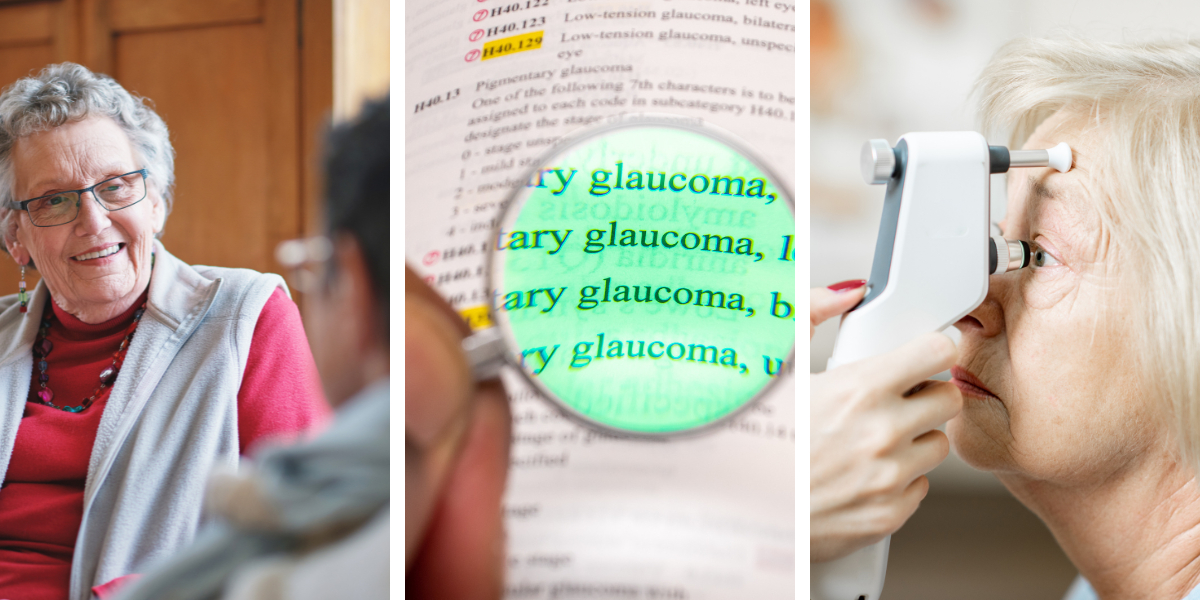
Glaucoma Awareness Month
January 17, 2023January is National Glaucoma Awareness Month. While it may seem like a strange condition to observe for a month, those impacted by glaucoma completely understand the importance of Glaucoma Awareness Month. With 3 million people currently suffering from glaucoma, it is one of the most common eye diseases in the United States. It is also one of the leading causes of vision loss and even blindness.
Utilize Glaucoma Awareness Month to recognize how to catch the disease early and potential treatments.
What is glaucoma?
Glaucoma is a disease characterized by increased pressure within the eye. This causes damage to the optic nerve, which delivers messages from the eyes to the brain. As a result, damage to the optic nerve can lead to loss of vision and eventual blindness, if left untreated.
Glaucoma is the second leading cause of blindness in the world. It is noticed in the loss of one’s peripheral vision. Once lost, vision cannot be regained. However, early treatment can stop the worsening of the condition. The three most common types of glaucoma are:
- Primary open-angle glaucoma—the slowest developing glaucoma
- Angle-closure glaucoma—the least common but fastest-developing glaucoma that results in rapid vision loss
- Normal-tension glaucoma—the optic nerve experiences gradual damage despite lower eye pressure
Who is at the highest risk for glaucoma?
Certain risk factors raise your likelihood of developing glaucoma. Those over the age of 60 are more likely to develop the condition than any other age group. In addition to age, certain races—like those of African American, Latino, or Asian descent—may be more predisposed to glaucoma. This is due to common genetic factors like thinner corneas, optic nerve blood flow, and even the shape of the eye
In addition to family history, health concerns like diabetes or hypertension can also raise your risk of glaucoma. Both of these conditions directly impact blood flow, which affects eye pressure.
Comprehensive eye exams are the best way to prevent glaucoma from causing long-term damage. So, if you have any combination of the above risk factors, it is important that you attend regular eye exams—once or twice annually, depending on your age. Early detection allows you to move forward with treatments more quickly.
How to treat glaucoma
If caught early, treatment for glaucoma is relatively simple. Glaucoma supplements and medicated eye drops are options for mild cases. These allow you to move on with your life without much disruption. However, more serious cases may need to be treated with surgeries.
- Selective laser trabeculoplasty—a laser stimulates the release of fluid from the eye to reduce eye pressure by 20 to 30%.
- Trabeculoplasty—surgeons create a new pathway for fluid to drain from the eye.
- Aqueous shunts—drainage implants placed in the eye to reduce pressure on the optic nerve by reducing eye fluid.
- Laser cycloablation—freezing cells that produce fluid reduces eye pressure. This surgery is reserved for cases when the eye’s anatomy isn’t correct for the above surgeries, or if glaucoma has progressed too far.
How can I observe Glaucoma Awareness Month?
Just like any of the other monthly observations, the best way to respect Glaucoma Awareness Month is to raise awareness among friends and family. Talk to loved ones about the importance of regular eye exams and eye health. If you have been diagnosed with glaucoma, discuss how it impacts you and let them know what they can do to help.
Donating to organizations that work to find a cure for the disease is also a fantastic way to observe Glaucoma Awareness Month. While there is no cure, researchers are actively working towards finding a solution to the disease. Additional funding may provide them the resources they need to make great strides in exploration of the disease.
If you haven’t had an appointment with your eye doctor in some time, use January as your reminder to do so.
A caregiver can help make your life easier
Whether or not you’re experiencing vision loss, general activities of daily living grow to be difficult as you age. An at-home caregiver can help make life easier.
At Home Care Powered by AUAF, our staff is trained to offer the best in-home care for the greater Chicago area. For 30 years, seniors and their families have rested easy knowing they are in good hands. From personal care services, to medication reminders, to errands, to companionship, you’ll have all the support you need in one place.
If you’re curious how a home care professional can make a positive impact on your life, call us at 773-274-9262. We would be happy to discuss how we can assist you.
Articles:
-
How to Use FaceTime: a Senior’s Guide
March 20th, 2024 -
The Best Organic Cleaning Products for Caregivers
March 19th, 2024 -
Celebrating St. Patrick’s Day with Seniors
March 14th, 2024 -
Intellectual Activities for Seniors to Keep their Brains Stimulated
March 13th, 2024 -
Tips for Communicating with Seniors with Hearing Loss
March 12th, 2024 -
How to Learn a New Language as an Older Adult
March 7th, 2024 -
Foods that Support Bone Health in Seniors
March 6th, 2024 -
A Note to Our Staff for Caregiver Appreciation Day
March 1st, 2024 -
The Importance of a Senior/Caregiver Bond
February 21st, 2024 -
Recreational Sports as Fitness for Seniors
February 27th, 2024 -
Exploring the Wonders of Reminiscence Therapy
February 15th, 2024 -
Staying Educated on Alzheimer’s Disease and Dementia Care
February 14th, 2024
Call Now! 773.274.9262






